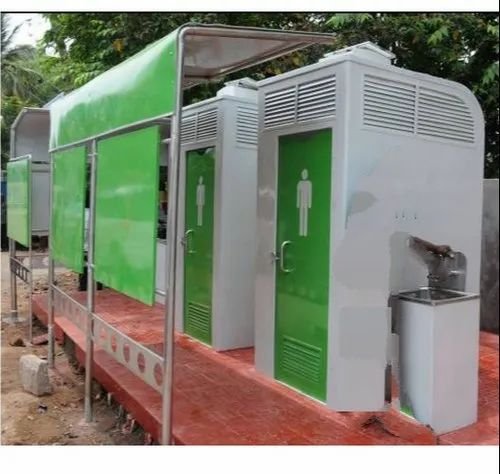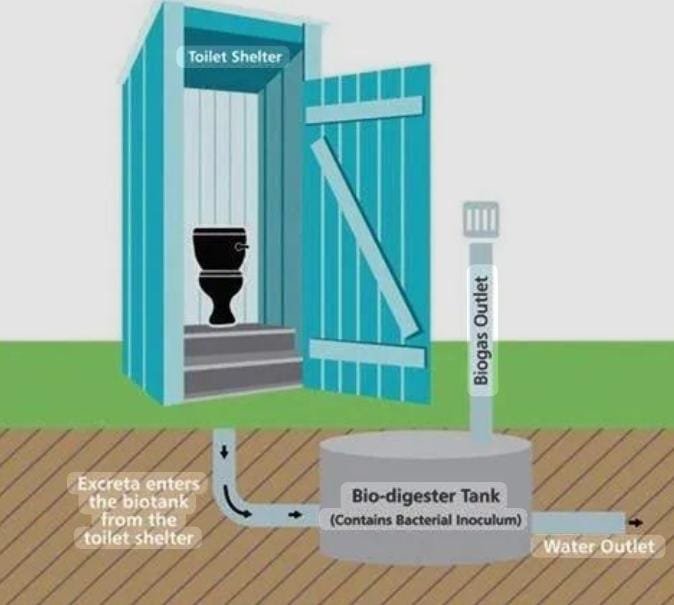 Today we are going to discuss the functionality of Bio-toilet which is trending nowadays.
Today we are going to discuss the functionality of Bio-toilet which is trending nowadays.
We will briefly understand the function of bio- toilets in simpler terms. let’s begin with understanding about the term “Bio-toilet”.
A Bio-toilet, also known as a composting toilet or ecological toilet, is a type of toilet that utilizes biological processes to decompose human waste and turn it into compost or other usable byproducts, without the need for traditional sewage systems or water flushing.
Here’s how a typical bio-toilet works:
Collection: Human waste is deposited into the bio-toilet, either directly from use or through a system of collection.
Separation: Some bio-toilets have a separation mechanism that separates solid waste from liquid waste. This separation helps in controlling moisture levels, which is crucial for efficient composting.
Composting: The solid waste is mixed with a bulking material such as sawdust, coconut coir, or peat moss. This mixture helps to absorb excess moisture, provide aeration, and create the right environment for microbial activity. The microorganisms present in the waste begin to break down the organic matter through the process of composting. This process typically requires oxygen, so some designs may incorporate ventilation systems to ensure proper aeration.
Evaporation: Liquid waste is often diverted to a separate chamber or system where it can evaporate or be treated separately. This reduces the moisture content in the composting chamber, preventing it from becoming too wet and facilitating composting.
Temperature and Time: The composting process generates heat as microorganisms break down the waste. The temperature within the composting chamber usually reaches levels high enough to kill harmful pathogens and break down organic matter effectively. The time required for complete composting depends on various factors such as temperature, moisture content, and the types of microorganisms present, but it typically ranges from a few weeks to several months.
Maturation: Once the composting process is complete, the resulting material undergoes a maturation period where it is left undisturbed to further stabilize and mature. During this phase, any remaining pathogens are destroyed, and the compost becomes safe to handle and use.
Disposal or Use: The matured compost can be safely removed from the bio-toilet and used as a nutrient-rich soil amendment for gardening or landscaping. Some bio-toilets may have mechanisms for easy removal of the compost, while others may require manual extraction.

Bio-toilet and Indian railways….
The role of railways in bio-toilet enrichment primarily involves the implementation and maintenance of bio-toilet systems in trains and railway stations to address sanitation and environmental concerns.
Bio-toilets are a sustainable alternative to traditional flush toilets that use minimal water and rely on bacterial decomposition to break down human waste into harmless byproducts such as water and gases. Railways play a crucial role in the following aspects:
Implementation: Railways are responsible for installing bio-toilet systems in trains and railway stations. This involves selecting appropriate technology, retrofitting existing toilets, and ensuring compliance with safety and hygiene standards.
Maintenance: Railways must maintain bio-toilet systems regularly to ensure optimal performance and hygiene. This includes cleaning, emptying, and replenishing bacterial cultures as needed to facilitate waste decomposition.
Awareness and Training: Railways may conduct awareness campaigns and provide training to passengers and staff on the proper use and maintenance of bio-toilets. This helps prevent misuse and ensures that bio-toilet systems remain effective.
Environmental Impact: By adopting bio-toilet technology, railways contribute to environmental conservation by reducing water consumption and minimizing the discharge of untreated waste into the environment. This helps prevent pollution of water bodies and protects ecosystems. The role of railways in bio-toilet enrichment is essential for improving sanitation standards, reducing environmental impact, and promoting sustainable practices in the transportation sector.


Overall, bio-toilets offer a sustainable and environmentally friendly alternative to traditional flush toilets, especially in areas where access to water and sewage infrastructure is limited. They help in reducing water consumption, preventing pollution of water bodies, and producing valuable compost for soil enrichment.
